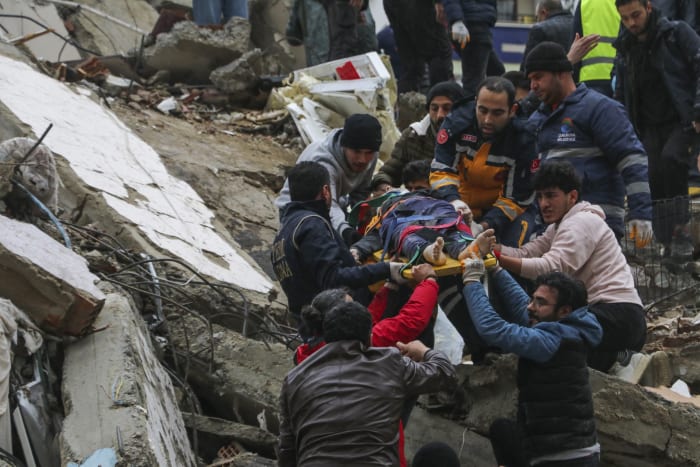The earth shook and buildings crumbled as a powerful 7.8 magnitude earthquake rocked wide swaths of Turkey and Syria early Monday, leaving behind a path of destruction that has so far claimed the lives of over 2,300 people. With hundreds still believed to be trapped under rubble, and the toll expected to rise as rescue workers search for survivors, the region is facing a humanitarian crisis of catastrophic proportions.
The quake, centered on Turkey’s southeastern province of Kahramanmaras, was felt as far away as Cairo, sending residents of Damascus rushing into the street and jolting awake people in their beds in Beirut. It struck a region that has been shaped on both sides of the border by more than a decade of civil war in Syria, with millions of refugees from the conflict now living in Turkey.
The destruction caused by the quake is vast and widespread, with thousands of buildings reported collapsed in a wide area extending from Syria’s cities of Aleppo and Hama to Turkey’s Diyarbakir. A hospital in Turkey collapsed, and patients, including newborns, had to be evacuated from facilities in Syria. In northwest Syria, the quake added new woes to the opposition-held enclave centered on the province of Idlib, which has been under siege for years, with frequent Russian and government airstrikes.
Rescue workers and residents have been searching for survivors, working through tangles of metal and concrete, and offers of help have poured in from dozens of countries, as well as the European Union and NATO. Mosques around the region were opened to provide shelter for people unable to return to damaged homes amid temperatures that hovered around freezing.
The strain on health facilities and hospitals has been immense, with many quickly filled with injured, and others having to be emptied, including a maternity hospital. The region sits on top of major fault lines and is frequently shaken by earthquakes, and hundreds of aftershocks were expected after the two temblors.
The damage evident from photos of the affected areas is typically associated with a significant loss of life, and the bitterly cold temperatures and the difficulty of working in areas beset by civil war will only complicate rescue efforts. Turkish President Recep Tayyip Erdogan said that because the debris removal efforts are continuing in many buildings in the earthquake zone, “we do not know how high the number of dead and injured will rise.”
The human cost of this tragedy is immense, and our thoughts are with the people of Turkey and Syria in this difficult time. We can only hope that with the outpouring of support from around the world, the rescue efforts will be successful, and that the people affected by this tragedy will soon be able to start rebuilding their lives.
Source: www.clickorlando.com
